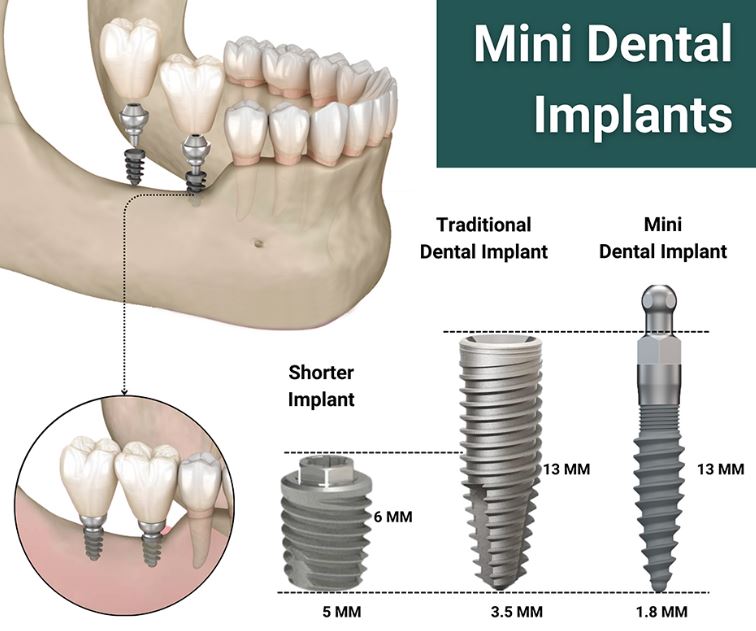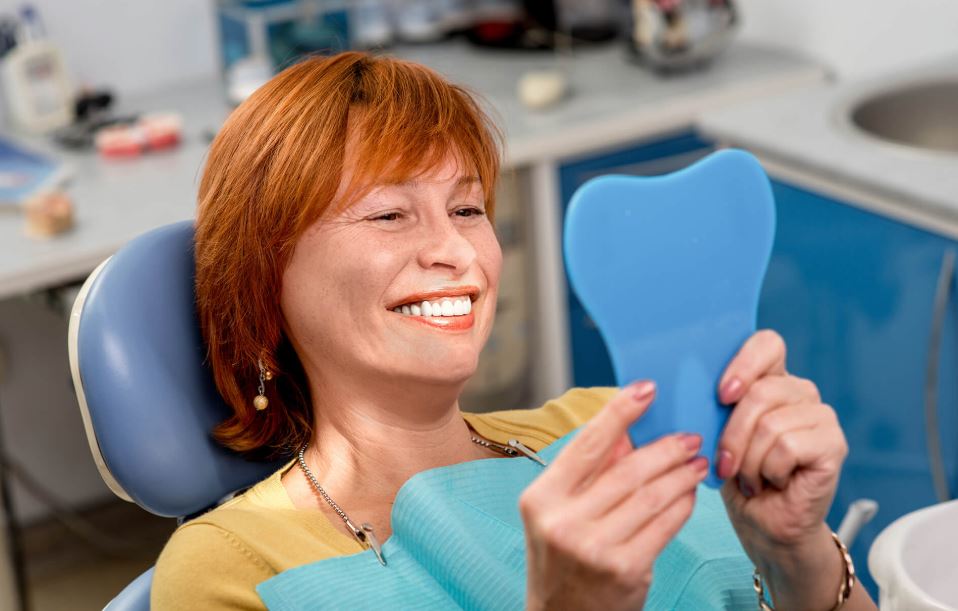What is Mini Dental Implants?
Mini dental implants (MDIs) are a modern dental solution designed to replace missing teeth or stabilize dentures in patients who may not qualify for traditional implants. These implants are thinner—generally less than 3mm in diameter—making them suitable for patients with reduced jawbone density. Unlike standard implants, mini implants are a one-piece unit, incorporating both the screw and the abutment.
What is the Cost of Mini Dental Implants?
You must have search mini dental implants cost near me by considering the cost of mini dental implants, it’s essential to understand the various factors that influence the price. On average, the cost per mini implant ranges from $500 to $1,500, compared to $3,000 to $5,000 per standard dental implant.

What is the Key Factors Influencing Mini Dental Implant Costs?
- Location of the Dental Clinic: Urban centers tend to have higher procedure costs.
- Dentist’s Expertise: Highly experienced or specialized implantologists may charge more.
- Number of Implants Needed: More implants naturally lead to a higher total cost.
- Material Used: High-grade titanium is typically more expensive but ensures long-term success.
- Pre-Implant Procedures: Bone grafting is usually not required, lowering overall costs.
Pros and Cons of Mini Dental Implants
Advantages of Mini Dental Implants
Less Invasive Surgery
One of the biggest advantages of mini dental implants is their minimally invasive placement. They typically require no incisions or sutures, resulting in less pain, reduced bleeding, and a significantly shorter healing period.
Lower Cost Compared to Traditional Implants
Mini dental implants are more cost-effective, making them accessible to a wider range of patients. This is especially beneficial for elderly patients or those living on fixed incomes.
Immediate Use
Many patients can have their dentures stabilized or teeth replaced on the same day as the mini implant procedure. This quick turnaround time significantly enhances convenience and quality of life.
Suitable for Narrow Ridges and Small Spaces
Patients with narrow jawbones or small tooth gaps, which are unsuitable for traditional implants, often find mini dental implants to be a viable solution without the need for extensive bone grafting.
Improved Denture Stability
Mini implants can be used to secure loose dentures, offering a major improvement in chewing ability, speech clarity, and self-confidence. This stability also eliminates the need for messy adhesives.
Faster Recovery
Thanks to their smaller size and less invasive placement, recovery time is significantly reduced—often within 24 to 48 hours. Patients typically experience less swelling and discomfort.

Disadvantages of Mini Dental Implants
Not Suitable for All Cases
Mini implants may not be ideal for patients requiring full-mouth reconstructions or those with severe bone loss. Their reduced size can limit their load-bearing capabilities, making them less durable for molar replacements.
Potential for Implant Fracture
Due to their slim profile, mini implants are more susceptible to bending or fracturing under excessive bite pressure. This risk is especially relevant for patients who grind their teeth or have a heavy bite force.
Limited Longevity
While mini implants can last several years with proper care, they generally have a shorter lifespan than standard implants. Regular maintenance and follow-ups are crucial to extend their longevity.
Fewer Long-Term Studies
Traditional implants have decades of clinical data supporting their effectiveness. Mini implants, being relatively newer, lack extensive long-term research, making it difficult to predict outcomes over 10–20 years.
Not Easily Replaceable
Unlike traditional implants, mini implants can be difficult to replace or upgrade, especially if complications arise. Once a mini implant fails, replacing it may involve bone augmentation and transitioning to a full-sized implant.
Who Is a Good Candidate for Mini Dental Implants?
Mini dental implants are ideal for:
- Patients with low bone density
- Elderly individuals seeking denture stability
- People with health conditions that preclude invasive surgery
- Those seeking a faster, affordable tooth replacement solution

However, individuals with poor oral hygiene, uncontrolled diabetes, or significant bone degradation should consult with their dentist about alternative options.
How Mini Dental Implants Are Installed?
- Initial Consultation: X-rays or 3D scans are taken to assess bone quality.
- Treatment Planning: The dentist maps out exact placement using digital imaging.
- Implant Placement: Under local anesthesia, the implants are inserted into the jawbone.
- Attachment of Prosthetics: Crowns, bridges, or dentures can be attached immediately or within a few days.
How To Care For Mini Dental Implants?
Proper care is essential to ensure long-term success. Follow these best practices:
- Brush twice daily with a soft-bristle toothbrush
- Use a non-abrasive toothpaste
- Floss or use an interdental brush to clean around the implant
- Schedule regular dental check-ups every six months
- Avoid biting hard foods like ice or nuts
Comparing Mini vs. Traditional Dental Implants
| Feature | Mini Dental Implants | Traditional Implants |
|---|---|---|
| Diameter | < 3mm | > 3.5mm |
| Surgical Invasiveness | Minimally invasive | More invasive |
| Healing Time | 1-2 days | 3-6 months |
| Cost | $500 – $1,500 | $3,000 – $5,000 |
| Ideal Use | Denture stabilization, narrow spaces | Full-tooth replacements |
| Durability | Moderate | High |
What Are Mini Dental Implants Covered by Insurance?
Dental insurance may cover a portion of the cost, especially when mini implants are used to stabilize dentures. However, coverage varies significantly between providers and policies. Patients are advised to review their insurance plan and consult their provider to understand what’s included.
Mini Dental Implants vs. Dentures: Which Is Better?
While traditional dentures offer affordability and ease of use, they often come with discomfort, poor fit, and the need for adhesives. Mini dental implants, on the other hand, provide a more stable and comfortable solution that feels more like natural teeth.

Why Choose Mini Implants Over Dentures?
- Eliminate slippage and discomfort
- No need for adhesives
- Preserve jawbone density
- Natural appearance and functionality
What are the Final Thoughts on Mini Dental Implants? Mini dental implants offer a practical, affordable, and less invasive alternative to traditional dental implants. They are especially suited for stabilizing dentures and for patients with limited jawbone mass. While they come with certain limitations, their benefits often outweigh the downsides for the right candidates.
Before proceeding, always schedule a comprehensive consultation with a licensed implant specialist to determine if mini dental implants are right for you.
What Are Mini Dental Implants Made Of?
Mini dental implants are typically made of titanium or titanium alloy, the same biocompatible materials used in traditional dental implants. Titanium is widely used in medical and dental procedures because it is:
- Biocompatible: It integrates well with human bone through a natural process called osseointegration, allowing the implant to fuse securely with the jawbone.
- Strong and Lightweight: Despite its light weight, titanium has exceptional strength, making it ideal for withstanding daily bite forces.
- Corrosion-Resistant: Titanium resists corrosion from saliva, food, and oral bacteria, ensuring long-term durability in the mouth.
- Hypoallergenic: Most patients tolerate titanium well, though in rare cases, zirconia (a ceramic alternative) may be used for those with metal sensitivities.
Mini implants are usually one-piece structures, meaning the implant post and abutment (the part that connects to the denture or crown) are fused together. This design simplifies the procedure and reduces the number of components required, making mini implants an efficient and stable solution for many dental applications.